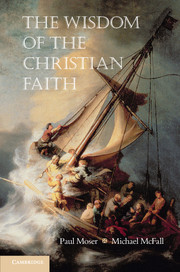Book contents
- Frontmatter
- Contents
- Contributors
- Introduction:Philosophy and Cruciform Wisdom
- Part One Wisdom, Faith, and Reason
- Part Two Wisdom, Love, and Evil
- Part Three Wisdom, Contemplation, and Action
- 9 Meaningful Life
- 10 Beauty and Aesthetics in Theology: The Art and Beauty of Wisdom
- 11 Education for Political Autonomy
- 12 The Wisdom of Hope in a Despairing World
- Index
- References
9 - Meaningful Life
Published online by Cambridge University Press: 05 December 2012
- Frontmatter
- Contents
- Contributors
- Introduction:Philosophy and Cruciform Wisdom
- Part One Wisdom, Faith, and Reason
- Part Two Wisdom, Love, and Evil
- Part Three Wisdom, Contemplation, and Action
- 9 Meaningful Life
- 10 Beauty and Aesthetics in Theology: The Art and Beauty of Wisdom
- 11 Education for Political Autonomy
- 12 The Wisdom of Hope in a Despairing World
- Index
- References
Summary
The Secularist Challenge
What difference does a theistic, and more specifically a Christian, worldview make to the idea of a meaningful life? In our increasingly secularized culture, many (including probably the majority of philosophers) are inclined to answer, to both the general and to the more specific question, “none whatsoever.” An increasingly popular view is that any meaning that life might have must be found entirely from our own chosen activities and projects. Meaning is something we have to create for ourselves. What (so runs the view under discussion) could God have to do with it? How could his purposes and plans for us (even assuming that he exists) generate meaning for us? Suppose we found that our origins derived from an alien intelligence, who injected some early version of DNA into some molecules in the primordial terrestrial soup, so that over time humans would emerge on this planet, and their struggles, setbacks, and temporary triumphs would serve as entertainment when viewed on celestial television by the denizens of a distant galaxy. Would we, if we discovered these facts, be the slightest bit inclined to say our lives were more meaningful as a result? If anything, surely, we might be inclined to conclude the reverse. We might be inclined to think that discovering that we were the puppets of these aliens – or, if not that, then at the very least fodder for their entertainment industry – had the effect of making our lives even more absurd and futile than they were in danger of being already.
- Type
- Chapter
- Information
- The Wisdom of the Christian Faith , pp. 175 - 196Publisher: Cambridge University PressPrint publication year: 2012
References
- 4
- Cited by



